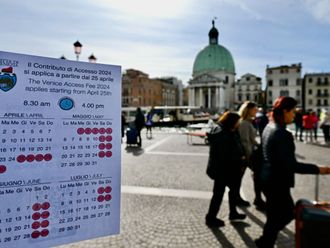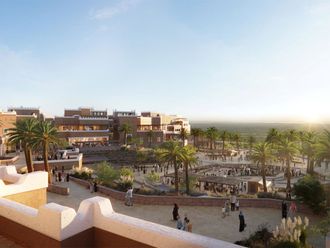Arbil: The ministry of tourism has 417 employees and big plans: "We need three or four times as many hotels as we have now," says Nimrud Youkhana, the minister, "and we need to get more airlines to fly here."
Tourism in Iraq? More hotels in a country whose name evokes images of truck bombs and mayhem, kidnappings and beheaded foreigners?
An advertising campaign in the US called 'The Other Iraq', seeks to create interest in the three northern provinces that blossomed into a quasi-independent state in the 16 years since the US placed a protective umbrella - the 'no-fly zone' - over the region to stop a genocidal anti-Kurdish campaign waged by Saddam Hussain.
Administered by the Kurdistan Regional Government (KRG), the provinces have largely escaped the violence that has been tearing apart the rest of Iraq since the US invasion in 2003, toppled Saddam and uncorked long-suppressed sectarian hostility.
"We have some way to go still," said Youkhana, "but we plan to eventually hold annual folklore events like the Jerash festival," a reference to the Jordanian city which brings together performers from all over the world each summer.
Exotic destination
Customers the ministry wants to attract people from the Mideast who appreciate mountain resorts in an Alpine setting (and a relaxed attitude towards alcohol) and Europeans in search of exotic destinations and archaeological remains dating back thousands of years.
Youkhana's plans, and the mere existence of a tourism ministry, highlight a bullish view of Kurdistan's future which is also evident in building projects on a grand scale, from a 6,000-shop mall to a string of US-style gated communities with names such as Dream City, Empire Villas and American Village.
Near the airport, Naz City, a new complex of 14 high-rise apartment towers, is cabled for high-speed internet access. New hotels under construction include one by the German luxury chain Kempinski.
And rising in the shadow of Arbil's citadel, near where Alexander the Great defeated King Darius of Persia, the huge Nishtiman mall features Kurdistan's first escalator - a magnet for children who ride it up and down in wide-eyed wonder.
The Board of Investment, a government agency set up last summer, has approved more than $3.5 billion in development projects.
The Kurds' main argument to persuade foreigners to visit and invest is security. "I feel safer in Arbil or Suleimaniyah than in Camden, New Jersey," said Harry Schute, a retired US army colonel, who served in Iraq and is now a security adviser to KRG president Massoud Barzani.
"But people hear 'Iraq' and they think violence. There's a lack of understanding that Baghdad and Arbil are different worlds."
Obstacles to opening up Kurdistan to the world include the travel advisories governments issue to their citizens. The US makes no distinction between the Kurdish north and the rest of Iraq and warns against travel there.












